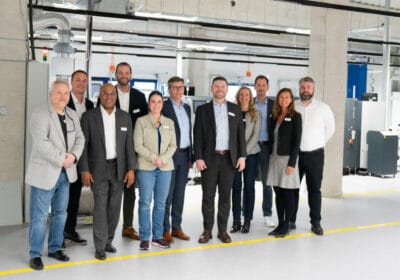With manufacturing on the cusp of a technological revolution, a flagship research facility is opening its doors at the University of Nottingham to help future-proof UK industry in a competitive global market.
Siemens UK CEO, Juergen Maier officially opened the Advanced Manufacturing Building (AMB) on Friday 7 December 2018.
With a total research portfolio of £80m, the nationally-significant development consolidates the University’s manufacturing science and technology capabilities, expertise and industrial support.
The AMB is home to the Institute for Advanced Manufacturing(IfAM), which has 96,000 sq ft of world-class research and teaching facilities for design, manufacturing, assembly and metrology, measurement, testing and modelling.
Scientific research at the Institute underpins many high impact innovations in key sectors, such as aerospace, automotive, food, biomedical, energy generation, chemical products and digital manufacturing.
Professor Svetan Ratchev, Director of IfAM, described the AMB as one of the largest manufacturing, engineering, teaching and research facilities in the UK, housing some 400 staff, students and researchers.
“Skills challenges remain a key issue for many manufacturing businesses in the UK, due to factors such as the fast pace of technology development, an ageing workforce and a shortage of graduates with relevant multidisciplinary skills and experience. The Institute helping to shape the manufacturing research agenda nationally and internationally and is supplying the technology and specialist skills to support key industrial sectors and encourage the growth of emerging industries.”
IfAM provides a unique environment for the University to work with manufacturers of all sizes to deliver world-class research and transfer the knowledge created into high-impact industrial technologies.
Big-name industrial collaborations
The University collaborates with many of the world’s leading companies, including Airbus, BAE Systems, BMW, Bentley Motors, Cummins, GSK, HP Enterprise, IBM, Jaguar Land Rover, Laing O’Rourke, Nestle, PepsiCo, Rolls-Royce and Siemens.
IfAM is helping many of these international brands to cost-effectively manufacture high value products by providing next-generation technologies for improving productivity by utilising the latest research in 3D printing, artificial intelligence, collaborative robotics, data analytics, material science and manufacturing systems and processes.
The Institute also specialises in helping industry to produce the products of the future, ranging from highly complexity, customised future aircraft and cars to artisan or allergen-free lines for big name food brands and personalised medicine formulations for the pharmaceutical industry.
Juergen Maier, Chief Executive of Siemens UK, said: “This new facility heralds the start of something truly special for Nottingham, and will help place the region and indeed the country at the cutting edge of digital manufacturing. Why is this important? It’s important because our future lies in driving a new technological revolution focusing on AI, automation, robotics and 3d printing as well as many other new exciting technologies. It will ensure graduates are at the cutting edge and ready to take up the high productivity, high wage jobs of the future.”
Local SME support
IfAM is supporting local growth by helping business of all sizes to be at the forefront of technological and business innovation. Many SMEs, for example, experience difficulties in navigating new technologies such as digital manufacturing.
To counteract this issue, in collaboration with the Cambridge Institute for Manufacturing, IfAM has started a new EPSRC-funded project “Digital Manufacturing on a Shoestring” to explore how SMEs can benefit from low cost data analytics and smart technologies.
IfAM also recently introduced the Digital Manufacturing Training System for SMEs (Digit-T) – an EU-funded bespoke online training programme tailored to help SMEs better understand digital manufacturing and its benefits, and how to start applying the new technologies in their own companies.
“In addition to supporting local SMEs, another aim for IfAM is to become a key business incubator for new manufacturing start-ups in the East Midlands by providing the technical support, training and expertise for commercialising the latest research results of the Institute,” adds Professor Ratchev.
Support is also in place for SMEs through the Nottingham Manufacturing Network, now based at the AMB, which provides a forum for smaller regional manufacturing businesses to share best practice and experiences and raise the profile of manufacturing across Nottinghamshire.
A hub for manufacturing research expertise
IfAM brings together the research activities of the Advanced Manufacturing, 3D Printing and Additive Manufacturing and Polymer Composites Research Groups under one roof with over 200 academics, researchers and PhD students, providing a focal point for manufacturing innovation.
The Institute also comprises the Centre for Additive Manufacturing (CfAM), the Centre for Aerospace Manufacturing and the Precision Manufacturing Centre, delivering a range of collaborative projects funded by UK Research Councils, European Framework programmes and industrial partners.
In collaboration with the Schools of Pharmacy and Chemical Engineering, CfAM was successful in securing £1m funding from the Wolfson Foundation for a clean room facility. This facility is supporting CfAM research in the healthcare area and to widen the palette of materials for 3D ink jet and extrusion printing platforms.
This would be used primarily for the CfAM’s pharmaceutical and electronics-orientated research that should be conducted in a setting with a low level of environmental pollutants or where light-sensitive materials are used.
The Clean Room is equipped with a comprehensive suite of pharmaceutically focused 3D ink-jetting and extrusion printer systems alongside with characterization equipment for developing pharmaceuticals that would facilitate new avenues of both academic and industrially focused research.
This unique facility is a platform for demonstrating the power of AM to change pharma delivery aiming to produce tablets, implants and other drug loaded devices that offer releasing control over structure and composition, ultimately allowing the dose and the drug(s) to be personalised to the need of patients.
The new building also houses the Rolls-Royce University Technology Centre in Manufacturing and On-Wing Technology.
The UTC boasts a multi-disciplinary research team exploring all aspects of aerospace manufacture, with specialist interest in on-platform inspection and repair systems. From the UTC, the University is working with Rolls-Royce on a new range of robot ‘mechanics’ set to transform their jet engine maintenance, saving the company time and money and cutting delays for air passengers.
Minister for Local Growth, Jake Berry MP, said: “We are committed to boosting economic growth across the whole of the Midlands Engine and building a country that works for everyone.
“Our £5 million investment in the University of Nottingham’s new Advanced Manufacturing Building through the Local Growth Fund shows our modern Industrial Strategy in action. This state-of-the-art facility will benefit Nottingham, the Midlands and the whole UK economy by driving innovation, equipping people to secure highly skilled jobs and supporting manufacturing businesses of all sizes to thrive.”
Elizabeth Fagan, Chair of the D2N2 Local Enterprise Partnership, added: “The Advanced Manufacturing Building is exactly the kind of innovation-led facility needed to take forward the ambition laid out in our Strategic Economic Plan and aid new, hi tech growth sectors and research and development. That is why the D2N2 LEP is proud to invest heavily in a flagship project, using its Local Growth Fund allocation from Government.”
Midlands Engine Chairman, Sir John Peace, said: “Our industries in the Midlands are known for being at the forefront of technological innovation. This new facility will help reinforce the Midlands as a region that is at the cutting edge of digital manufacturing and, at the same time, provide our businesses with a workforce that has all of the necessary skills that will help our businesses thrive.”
Spin-out ventures
Two new spin-out companies – Added Scientific, an additive manufacturing consultancy and Taraz Metrology, a new supplier of metrology and quality inspection technologies for the AM market – are led by key researchers from the Advanced Manufacturing Building.
Designed by Bond Bryan Architects and built by J. Tomlinson, the Advanced Manufacturing Building received £5m funding from D2N2 Local Enterprise Partnership, the private sector-led Partnership of business, local authorities, skills and training providers, and community and voluntary organisations which promotes economic and jobs growth across Derby, Derbyshire, Nottingham and Nottinghamshire. Funding resources include more than £200m from the Government’s Local Growth Fund, used to part-fund infrastructure projects in the LEP’s area which directly help grow the economy.
Advanced Manufacturing is critical to the economy of the D2N2 Local Enterprise Partnership area (Nottingham, Nottinghamshire, Derby and Derbyshire), and the LEP has ambitious plans to support the development of a world class innovation-led, highly productive economy with a global reputation for manufacturing excellence.
The AMB, which sits at the entrance to the University’s Jubilee Campus, forms part of a decade-long £100m investment plan by the University into manufacturing research and training, comprising funding from the University itself, research councils, industry, government and the EU.
Areas of research focus at the AMB:
- Advanced manufacturing technology
- Additive Manufacturing
- Bioengineering
- Composites
- Advanced materials
- Drug delivery and tissue engineering
- Food sciences
- Human factors
- Machining and condition monitoring
- Manufacturing metrology
- Process and environmental technologies
- Operations Management (OM) and Information Systems (IS)
- Human-machine interactions







